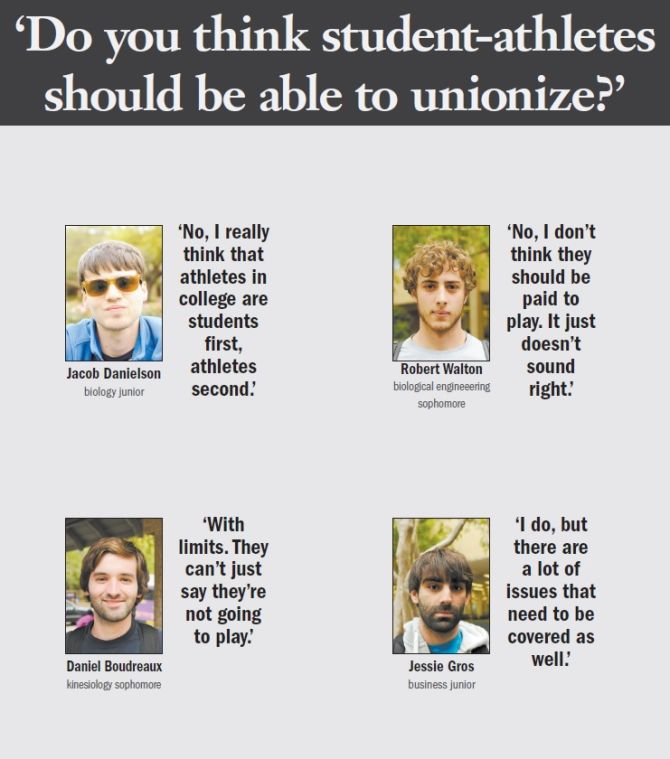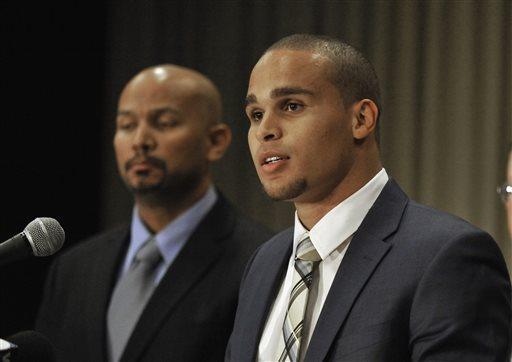College athletes might start getting paid. Or not. They’re definitely going to be represented by a union, though.
Northwestern quarterback Kain Colter originally brought his petition — that college players should be able to collectively bargain their rights under the protection of a union — to the National Labor Relations Board in February, and Wednesday the board ruled in his favor.
I, for one, am utterly opposed.
Who do these players think they are? Why should they be afforded the rights that every other American has? All they do is play a stupid game.
It’s not like the organization they play for profits off their labor. I mean, the 12-year deal ESPN reached with the NCAA to extend the players’ season into a playoff is only worth $475 million per year. That’s only a total of $5.64 billion. Add that to individually-negotiated conference TV deals, like the Southeastern Conference’s, which is worth upward of $2.25 billion, and schools barely have enough to keep the stadium lights on, much less compensate the players.
Maybe that’s why according to a report by the National College Players Association and Drexel University Sports Management, players at LSU live $2,500 below the federal poverty line.
I mean we “pay” them already, right? Why should a full-ride scholarship to the university of their choosing not be enough?
It’s not like the average college-athlete has more on their plate than a regular student. It’s not like they have daily practices, workouts, film sessions or meetings to attend.
It’s not like they actually have to go to class. Everyone knows the athletes get special favors from their teachers.
Maybe that’s why according to a CNN report, the average English score for an LSU football player on the ACT was an 18.4, when many academic experts consider the score for college literacy is a 16. Maybe that’s why according to the same CNN report, 60 percent of football and basketball players attending college at UNC-Chapel Hill read at only a fourth-eighth grade level. Colleges seem to be setting up their student-athletes for success, right?
Why should they be able to negotiate for medical rights and protect themselves against career-ending injuries or concussions? I mean, 18 to 22 year old people are definitely less susceptible to peer pressure from coaches or teammates to play through pain than established veterans who are protected by the NFL Players Association.

It’s not like chronic traumatic encephalopathy (CTE) has been proven to be deep-rooted among football players. It’s not like that same disease causes normal men, people considered upstanding citizens during their playing careers, to consider suicide or hurt themselves or their loved ones. What do college football players have to worry about anyway? Everyone knows concussions only happen in the NFL.
Maybe that’s why senior women’s basketball guard Jeanne Kenney continues to play, despite countless concussions suffered during her time at LSU.
Speaking of competition, what will happen to the small teams? What about the spirit of competition in college football, won’t the teams with the most money just dominate the sport?
It’s not like in the past 10 years 99.3 percent of the yearly top 100 recruits are already choosing teams from big conferences like the SEC, Big 12, Pac-12 or ACC. It’s not like they are currently choosing those schools because teams like Alabama or LSU can spend millions right now upon millions upgrading weight rooms, stadiums and practice facilities, while teams in the Sunbelt are left picking up the scraps and hoping to find a gem.
Maybe that’s why no other conference has won the national championship in the BCS era outside of those four conferences.
These meddling kids need to realize what they are doing to the world of amateur sports.
Maybe they can find some perspective in the words of Walter Byers — the first executive director of the NCAA, “Collegiate amateurism is not a moral issue; it is an economic camouflage for monopoly practice.”
Seriously, why should we allow these kids to unionize and protect themselves? It’s not like they have the rest of their lives in front of them.
Opinion: No, NCAA athletes shouldn’t get basic human rights
By Trey Labat
March 26, 2014

FILE – In this Jan. 28, 2014, file photo, Northwestern quarterback Kain Colter, right, speaks while College Athletes Players Association President Ramogi Huma listens during a news conference in Chicago. In a Wednesday, March 26, 2014, landmark ruling, a federal agency has given football players at Northwestern University the green light to unionize. (AP Photo/Paul Beaty, File)
More to Discover

